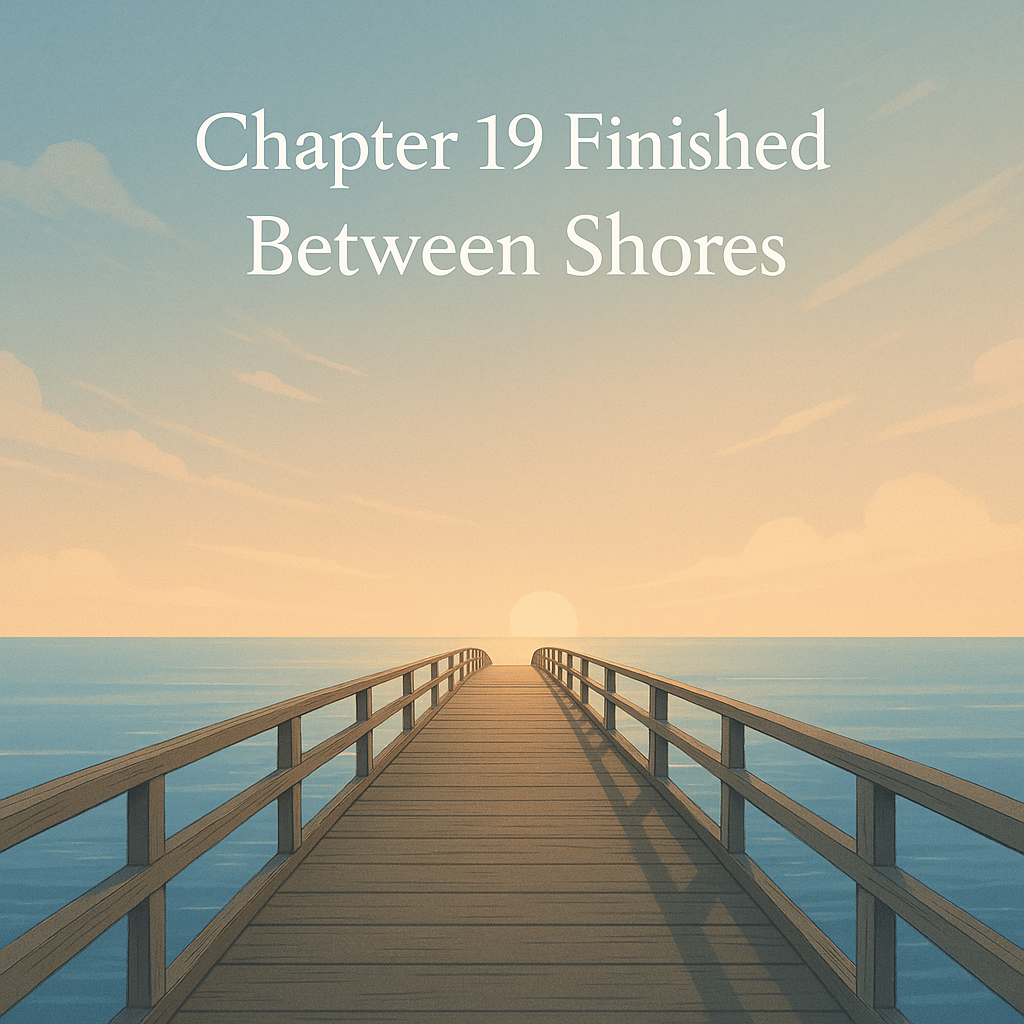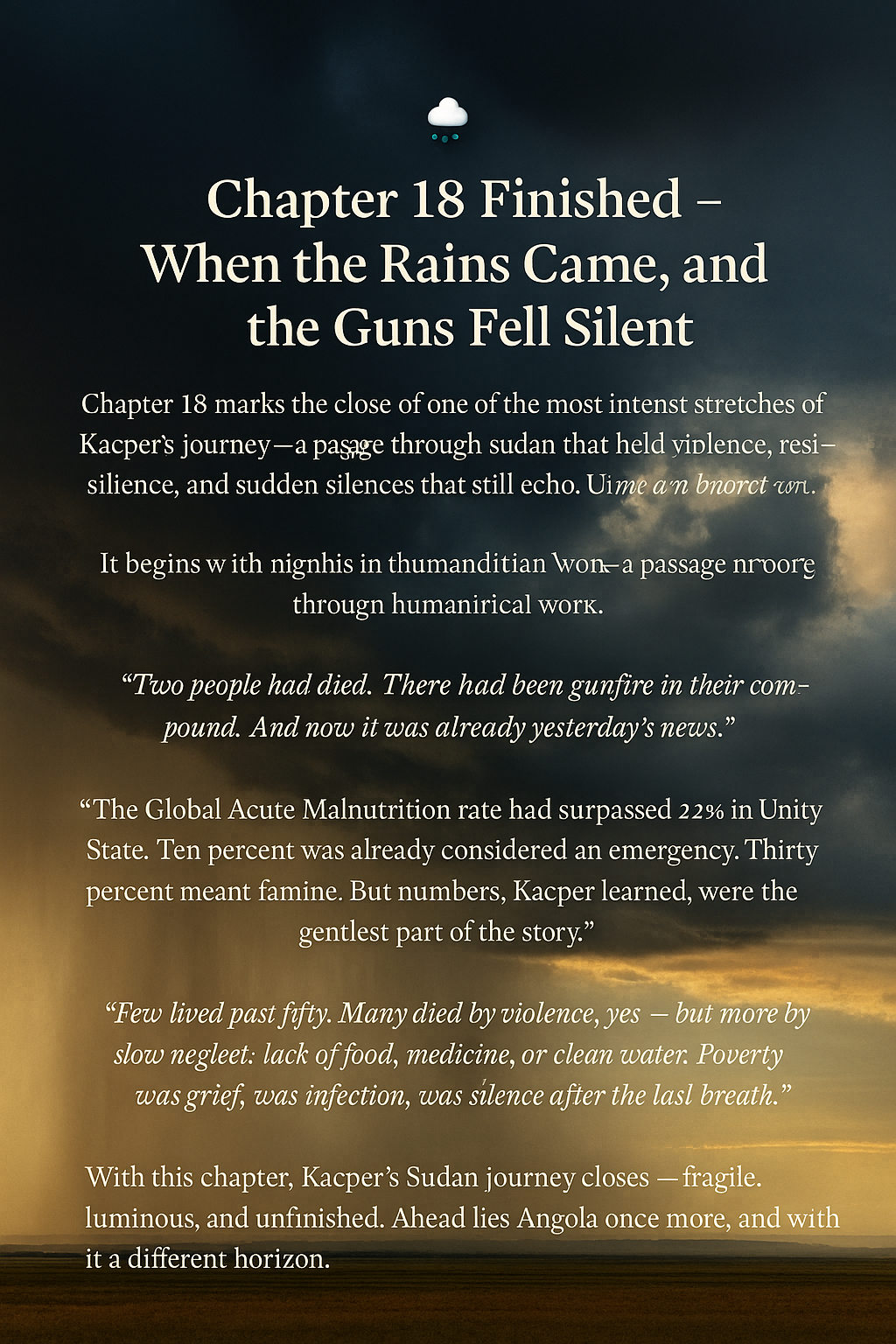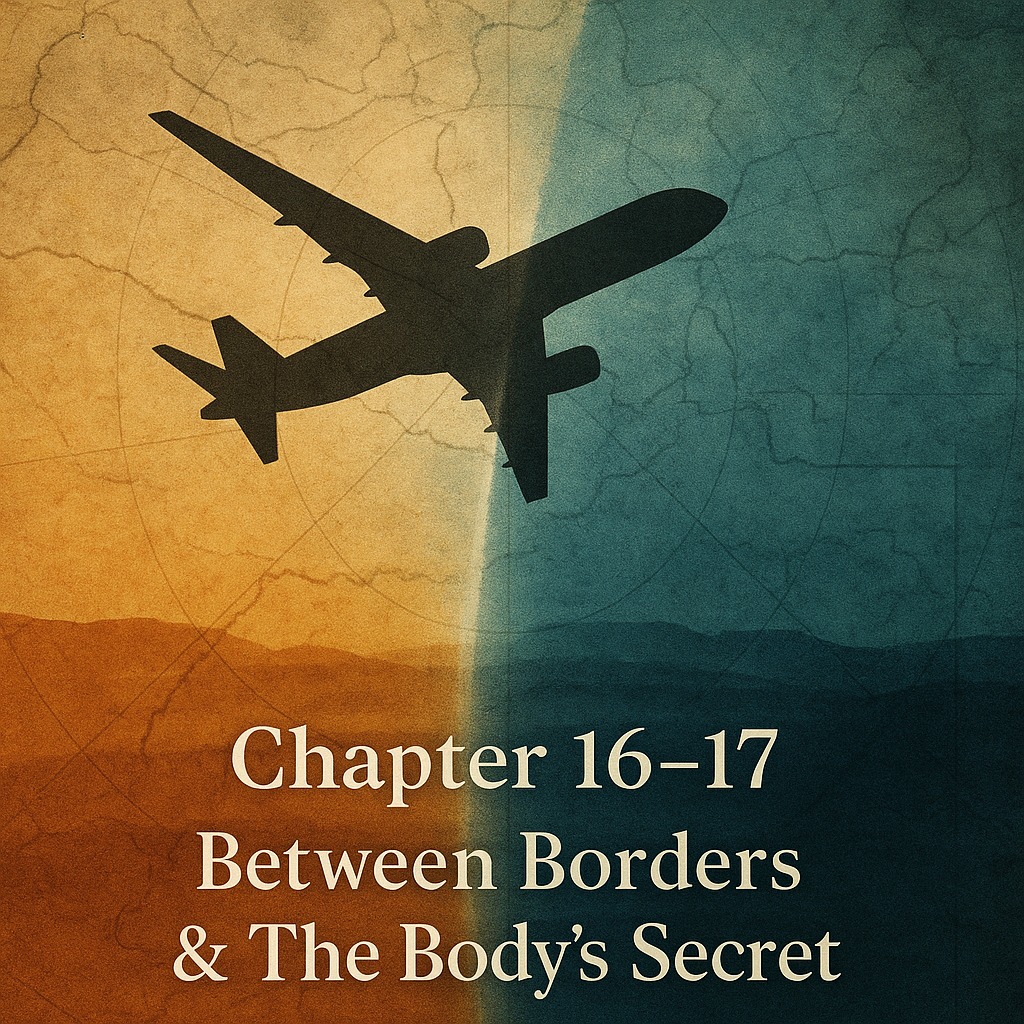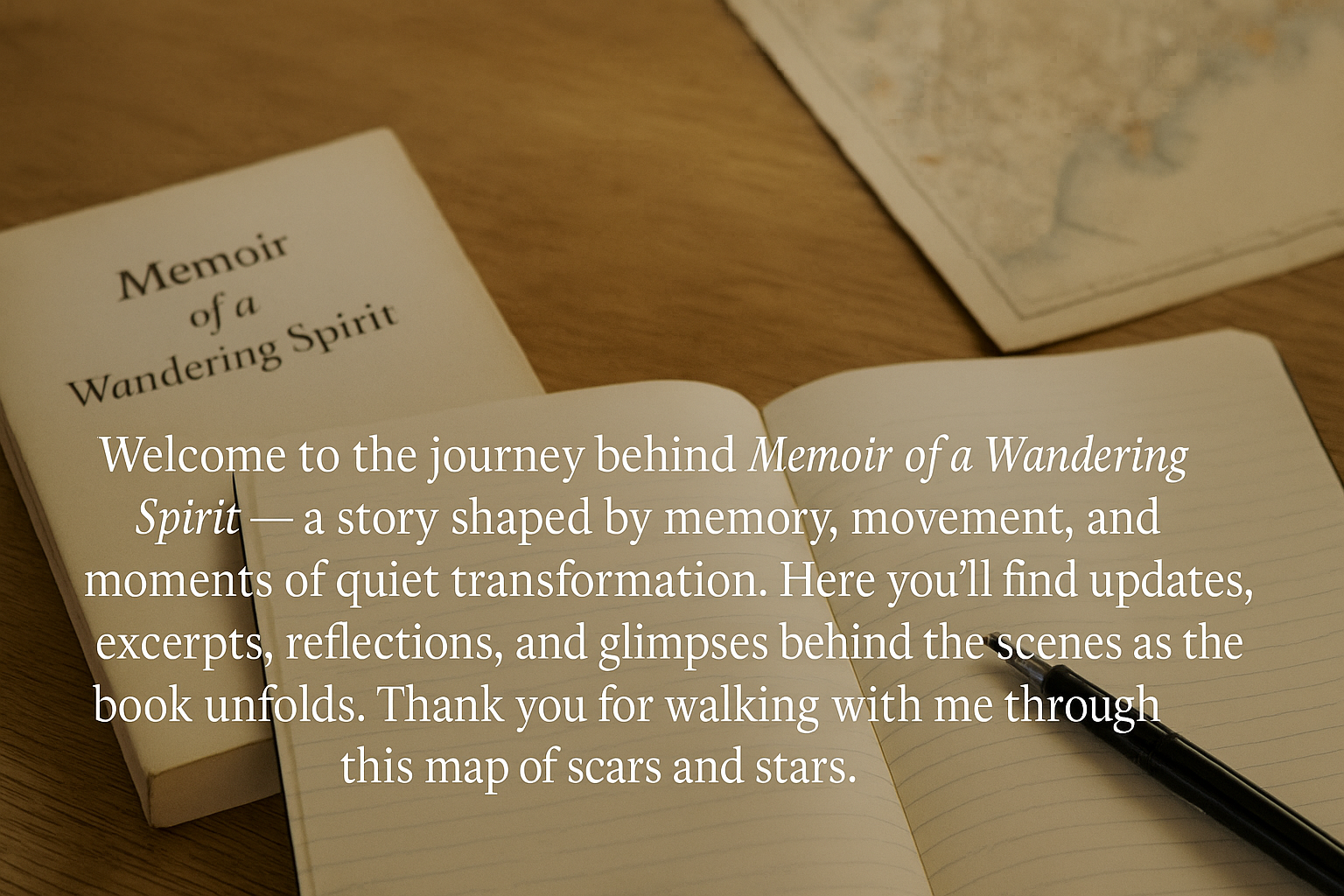Chapter 19: Between Shores — Complete

Chapter 19 is now finished, carrying Kacper into one of the most layered transitions of his journey. Titled Between Shores, it traces the crossings — physical and emotional — that mark the passage from one stage of life to another.
The chapter begins in New York City, where the dizzying scale of Manhattan seemed to dwarf him. Yet in this metropolis, a piece of home emerged: a reunion with his old friends from Nowy Sącz. Their laughter spilled into the roar of the city, proof that friendship could travel as surely as he did.
“They stood together on a New York sidewalk, the city roaring around them, and for a moment it was as if Nowy Sącz itself had crossed the Atlantic. The past and the present folded into one another, a reminder that no distance could erase the bonds of origin.”
The journey then shifts to Prague, where Kacper travelled with his mother. Walking over Charles Bridge, pausing in quiet squares, they found a closeness that had often been obscured by distance and circumstance. For Kacper, Prague became not only a lesson in history, but a lesson in presence.
“Prague unfolded not just as a city of spires and bridges, but as a lesson in how beauty and burden can exist side by side. With his mother at his side, Kacper felt that whisper more deeply than ever.”
From there, the narrative settles in Paris, where the city itself became a passage. By day, he learned the ropes of humanitarian work — logistics, finance, the architecture of missions. By night, he wandered the banks of the Seine, falling in love with the rhythm of a place that seemed to breathe both past and future. Paris was where vocation and longing converged.
Finally, the chapter carries him to Île de Ré, where bicycles, harbours, and the Atlantic winds taught another kind of lesson: that learning is not only about ambition or duty, but also about noticing, slowing down, and being reshaped by the ordinary.
📷 Photo Album – Île de Ré
“The island revealed itself in colours more honest than any textbook: whitewashed houses with green shutters, geraniums spilling over stone sills, salt in the air. Kacper realised that learning could be a slow act of noticing.”
Between Shores is not only about moving between countries. It is about being suspended between identities — son and professional, learner and humanitarian, dreamer and doer. Each crossing leaves a trace. Each shore leads to another.
Chapter 18 Finished — When the Rains Came, and the Guns Fell Silent

Chapter 18 marks the close of one of the most intense stretches of Kacper’s journey — a passage through Sudan that held violence, resilience, absurdity, and sudden silences that still echo.
It begins with nights in Rubkona and Bentiu, where gunfire tore through the darkness, only to be dismissed the next morning as “just two families fighting over cows.” In these contradictions — laughter beside loss, neighbourly protection alongside casual killing — Kacper discovered what it meant to live between terror and absurdity.
The chapter takes us deeper into the realities of humanitarian work: the conscription of two young Nuer nurses, Thiech and Gatluak, who vanished into warlord Paulino Matip’s militia overnight; the Therapeutic Feeding Centres in Wau and Unity State, where malnutrition rates reached famine levels; and the crushing weight of numbers that were never just statistics, but children’s bodies, parents’ impossible choices, and grief that became routine.
And yet, the rains did come. And, at least for a time, the guns did fall silent. Kacper’s time in Sudan closes with moments of surreal humanity — neighbours offering reassurances after bloodshed, colleagues sharing whispered jokes under mosquito nets, and his own return to Khartoum before reassignment to Angola.
Here are a few short excerpts to bring you closer to the texture of Chapter 18:
“The streets were nothing more than ruts of red dust, sometimes interrupted by puddles that reflected the sky like broken mirrors. Goats wandered freely, sometimes pausing to scratch against leaning wooden poles. Children ran barefoot, chasing tyres with sticks, laughing as if war had never passed this way. Women sat outside their tukuls weaving mats, grinding grain, or stirring pots balanced on three stones and fed with dry branches. The market buzzed quietly — stalls of sorghum, dried fish, worn-out clothes laid on tarps. Some women balanced impossible loads on their heads: plastic jerrycans, bundles of firewood, stacks of vegetables. Nuer-style homesteads stood in clusters — circular, low, with neat fences made of twisted branches. Smoke drifted lazily in the late light, from cooking fires or perhaps burning grass. It smelled of wood, ash, and something faintly sweet — a scent Kacper would come to associate with this place.”
“The Global Acute Malnutrition rate had surpassed 22% in Unity State. Ten percent was already considered an emergency. Thirty percent meant famine. But numbers, Kacper learned, were the gentlest part of the story.”
“Few lived past fifty. Many died by violence, yes — but more by slow neglect: lack of food, medicine, or clean water. Poverty was grief, was infection, was silence after the last breath.”
"That night, after the woman and her child had been admitted, Kacper and Lucy sat outside the compound, each with a mug of sweet karkadé in hand. The generator had been shut off early, so the silence was fuller than usual — punctuated only by the faint trill of night insects and the distant barking of dogs near the barracks.
Above them, the stars came in layers, thick and low, as if you could climb them if you dared.
Neither spoke for a long while.
Then Lucy broke the silence.
“Do you ever feel like we’re part of it?”
Kacper turned to her, not quite understanding.
“Part of what?”
“The theatre,” she said. “The coordination meetings. The clinics that aren’t clinics. The statements about humanitarian neutrality while everything burns around us.”
Kacper didn’t answer. He sipped the karkadé. Let it cool in his mouth.
Lucy continued, more softly now.
“I mean, we do what we can. But it’s like trying to keep the roof on a house that’s already on fire.”
He looked at her, this friend with whom he had shared so many battles, floods, impossible days. Her face was drawn, streaked with dust. Her blouse still carried the mark of the child she’d carried earlier — a faint outline of sweat and weakness. But her eyes were clear.
“We didn’t start the fire,” he said.
She smiled faintly.
“No. But we live in the smoke.”
They sat like that for a while — two foreign souls under a borrowed sky, neither defeated nor triumphant. Just tired. And still there."
With this chapter, Kacper’s Sudan journey closes — fragile, luminous, and unfinished. Ahead lies Angola once more, and with it a different horizon.
Chapter Updates: Between Borders & The Body’s Secret

Chapter 16: Between Borders
From the rooftop silence of Wau, where survival was written in dust and endurance, Kacper’s life kept stretching outward. The war had turned Wau into an island, but his work required crossings — north to Khartoum, east to fragile corners of Sudan, south to Nairobi, and sometimes further still, back to Paris or even Dublin. Each journey felt like slipping through a membrane: from Antonovs rattling over frontlines to the polished calm of Parisian cafés, from the immediacy of war to the cities that only brushed it through reports and statistics.
“Flying itself carried that same mixture of threshold and uncertainty. Once, on a journey to Khartoum aboard a Sudan Airways Antonov, Kacper found himself part of a scene that seemed almost too absurd to be real. The pilots were Russian, the rest of the crew Sudanese. Before take-off the plane sank into a patch of mud at the edge of the tarmac, and the solution was announced without hesitation: the passengers would push. Under the hot sun they leaned their shoulders into the steel belly of the aircraft, straining until the wheels rolled onto firmer ground. By then the engines had overheated, and one of the pilots, utterly unfazed, cooled them by pouring buckets of water over the metal as though dousing an animal after work. Kacper felt dread rising like a tide — his chest tight, his legs light with the urge to faint. Yet the crew’s calm, their matter-of-factness, made the surreal seem routine. If we die, he thought, it will at least be a highly unusual death. The thought itself, absurd and strangely comforting, carried him back on board.”
Flying became a theatre of the surreal. On one flight to Khartoum, passengers were asked to push the plane out of a patch of mud before overheated engines were cooled with buckets of water. Every border crossed was not just geographic but existential — between safety and danger, belonging and estrangement.
Chapter 17: The Body’s Secret
The battles outside soon gave way to one within. A sudden illness sent Kacper from Khartoum’s clinics into a whirlwind of uncertainty. The doctors whispered a word heavier than any he had carried before: cancer. The diagnosis was uncertain, yet its echo hollowed him out. Evacuation orders followed swiftly — first Paris, then Nairobi.
“The word cancer had not yet been confirmed, but it lingered in every silence, in every doctor’s lowered glance. It was not the war outside anymore. It was the possibility of a war inside.”
What had once been the rhythm of war became the rhythm of waiting rooms, procedures, and fragile reassurances. He lay under anaesthesia in Khartoum, endured colonoscopies in Nairobi, and later found himself at the Pasteur Institute in Paris, all within weeks. Four scopes, a surgery, and the gnawing thought that the fight might now be inside his own body.
“That evening, at Rue Niepce, the GNI team organised a small party. It felt good to be among familiar faces, who celebrated his recovery as warmly as he did. Kacper retold the story in all its strange twists: the Khartoum surgeon cutting into him for “haemorrhoids”, the colonoscopy that followed, the chaos of the flight to Kenya, the sudden death of his doctor, two more in Nairobi, the absurdity of a first-class ticket to Europe, and finally another at the Pasteur Institute — four colonoscopies and a surgery in a single month. The sheer improbability of it drew laughter, not mocking but grateful, a shared release — a celebration of life, survival, and the strange roads they take.”
Yet amid the fear there were moments of light — the relief of hearing that it was not cancer but a chronic condition to be managed, the bittersweet awareness of life’s precarious edge. Between borders of land and sky, of illness and health, Kacper found himself waiting, suspended between endings and beginnings.

